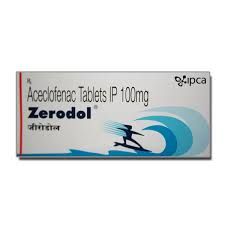Zerodol is a non-steroidal anti-inflammatory drug (NSAID) that combines aceclofenac and paracetamol to provide effective relief from pain and inflammation. This formulation is commonly used for various musculoskeletal conditions.
Key Features
- Active Ingredients: Each tablet typically contains:
- Aceclofenac: A potent NSAID that helps reduce pain and inflammation.
- Paracetamol (Acetaminophen): An analgesic and antipyretic that enhances pain relief and reduces fever.
- Packaging: Available in packs of 30 tablets, making it convenient for extended use.
Indications
Zerodol is indicated for:
- Pain Relief: Effective for conditions such as:
- Osteoarthritis
- Rheumatoid arthritis
- Ankylosing spondylitis
- Lower back pain
- Headaches and toothaches
- Inflammation Reduction: Helps alleviate swelling associated with various inflammatory conditions.
Mechanism of Action
- Aceclofenac works by inhibiting the enzyme cyclooxygenase (COX), which plays a key role in the production of prostaglandins—chemicals that promote inflammation, pain, and fever.
- Paracetamol acts centrally in the brain to reduce pain and fever, complementing the effects of aceclofenac.
Dosage and Administration
- Recommended Dosage: The typical dosage is usually 1 tablet taken twice daily, or as directed by a healthcare provider.
- Administration Tips: It is advisable to take Zerodol with food or milk to minimize gastrointestinal discomfort. Swallow the tablet whole with a glass of water.
Side Effects
Common side effects may include:
- Nausea
- Vomiting
- Abdominal pain
- Diarrhea or constipation
- Dizziness or drowsiness
Serious side effects requiring immediate medical attention include:
- Signs of allergic reactions (e.g., rash, swelling).
- Symptoms of gastrointestinal bleeding (e.g., black or tarry stools).
- Liver dysfunction (e.g., jaundice).
Precautions
- Contraindications: Not suitable for individuals with known hypersensitivity to aceclofenac, paracetamol, or any other components. Caution is advised for those with a history of gastrointestinal ulcers, liver disease, or kidney problems.
- Pregnancy and Breastfeeding: Consult a healthcare provider before use during pregnancy or breastfeeding.
- Alcohol Consumption: Avoid alcohol as it may increase the risk of liver damage and gastrointestinal issues.



